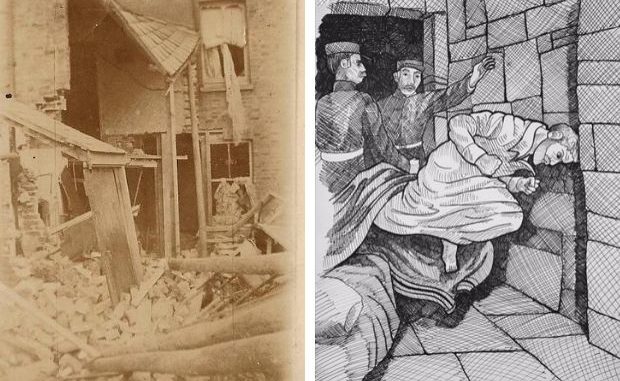
During the opening months of 1903, Ramsgate was “thrilled with horror” by news of a most extraordinary tragedy.
At 12.15am on Wednesday 25th February, as a raging gale buffeted the town, many of its residents were awoken by the roar of a loud explosion. The blast seemed to emanate from the eastern end of the town, somewhere near St Ethelbert’s Church.
PC Charles Barrow was the first to arrive at the scene in Flora Road, where the explosion had taken place, and what a sight he saw. The windows of the houses were either cracked or completely shattered, debris lay strewn everywhere and the road was filled with confused residents.
At number 14, identified as the source of the blast, the front door had been reduced to splinters and all the windows blown out. Barrow’s cautiously entered. Inside the air was redolent with the stench of cordite and burnt flesh. The rear of the house had been reduced to rubble.
In the wreckage of the kitchen, Barrow’s found the bodies of Samuel Henson (58) and his wife, Jane (42). Both were still alive, though seriously injured. The mutilated body of the couple’s son, William (20), was later found amongst the debris of what had once been the scullery. The family’s lodger, a young man called William Wells, had somehow managed to escape major injury.
Samuel and Jane were hurriedly taken to hospital where they made a slow recovery. The body of William Henson was transported to the mortuary.
William Wells would be crucial in establishing what had happened and the tale he told police was one of “domestic unhappiness”.
Samuel Henson was a drunken paranoid bully, who made his family’s life a misery and would frequently victimise his wife, accusing her of having affairs and wearing fancy clothes paid for through dishonest means. He worked as a construction labourer and hence frequently away from home but he contributed very little towards the family budget.
The two Williams were the main breadwinners: young Henson was a bricklayer by trade and also a rising star with Ramsgate FC. Unlike his father, he possessed a very affable nature. William Wells was a gardener and been lodging with the family since at least December 1902.
Samuel had left to look for work on January 3rd and during his absence Jane decided enough was enough. In a letter to her husband (dated 19th February) she wrote: “…we had better keep as we are than keep having these upsets, as you have promised to reform so many times and have gone back on you word”.
Her husband had used death threats against her in the past, the last being Christmas just gone. Jane’s letter may have been the catalyst that turned threats into action. As a ganger, working on construction projects such the Manchester Ship Canal, it was easy for him to obtain explosives.
When he returned to Ramsgate, four days later, he found no one home and decided to kill time at the Brown Jug. The landlord, James Saunders, recalled Samuel had with him an oblong package, about 12 inches, wrapped in a handkerchief.
After sinking three pints and smoking a cigar, Henson left to try his luck again at Flora Road. The package he placed in an old carpet bag. On the way he stopped off at the Hollicondane Tavern. He arrived back at Flora Road just after 6 p.m. and was met by his son, who took him to the pub. When William enquired what was in the bag his father replied nonchalantly: “just a few things of mine”.
If William’s purpose was to warn his father off then I didn’t work as Samuel went back to Flora Road. As soon as he was inside the house, things turned nasty. William Wells, deciding this was a family matter, retired to his room. “Henson asked his wife if he could come back,” Wells later told the Maidstone Assizes, “but she and William said together ‘no, you can’t, we’ve had enough’”.
“That’s it then,” Samuel replied.
Downstairs in the kitchen, Henson senior lit a cigar and then dropped the fuse (a large-headed match) into the carpet bag. Realising something awful was about to occur, young William grabbed the bag and rushed into the scullery, probably with the intention of throwing it into the back-yard but he was too late.
As her son grabbed the bag, Jane called to Wells. He had just reached his bedroom door when the floor fell away. He escaped injury by grabbing the door-frame.
Samuel Henson was found guilty of murder and sentenced to death. A petition for leniency was sent to the Home Office on the grounds his was mentally unsound. Twice he tried to commit suicide. The Home Office agreed and commuted his sentence to life imprisonment.

